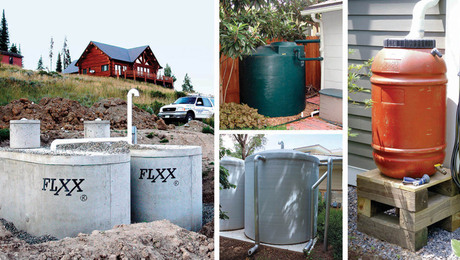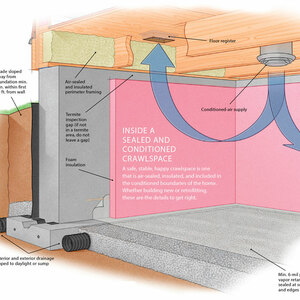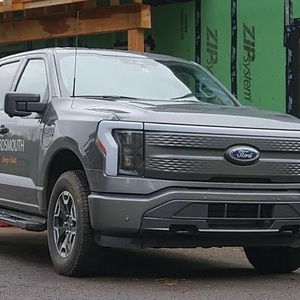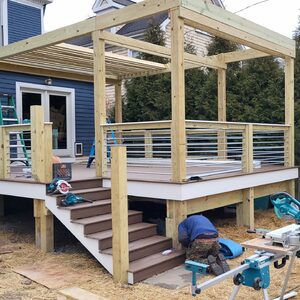I have a winterized summer home located in NH, an area prone to power outages. Most outages are of a short duration but in the past these outages have been days, the location tends to get a low priority becuse a majority of homes are seasoanal. This winter a returning child will be living there for the winter. The thought of the electric power situation has gotten me thinking about creating a backup power system. The cost of the big box systems are overwhelming (3-5K). I am looking for an alternative system, fewer curcuits and lower cost. Any thoughts would be welcomed.
Discussion Forum
Discussion Forum
Up Next
Video Shorts
Featured Story

There's a constant source of clean water for you to use, and all you have to do is collect it.
Featured Video
How to Install Exterior Window TrimHighlights
"I have learned so much thanks to the searchable articles on the FHB website. I can confidently say that I expect to be a life-long subscriber." - M.K.

















Replies
Simplest is a small portable genset and enough extension cords to reach refrigerator, furnace, and TV. Or at least the TV. You can "pre-plan" by installing a plug/socket on the furnace, and by installing a doggie door or some such to run the cords in. (If you have double-hung windows a piece of plywood cut to fit a partly-open window works well. Put a small hole in it, just big enough to pass the cords. Install gasket foam on the edges.)
Next step up would be to install a small (maybe 6 circuit) transfer switch. Move above items to the switch, run a cable outside to connect to the genset.
Store the genset in a (detached) shed when not in use. (For use pull it no closer than about 5 feet from the house, and away from possibly open windows, furnace makeup air intakes, etc.) Be sure to fire it up every 3 months or so, and change the oil once a year (when accumulated hours don't dictate sooner). Don't leave gas in it -- run it dry after use, and keep your gas in a separate can, with a few squirts of Stabil. Buy new gas every 3 months too -- put the old stuff in your car.
No electrons were harmed in the making of this post.
....I would like to add
.. when you exercise a generator every 3 mos. or so, you should run it with a load on it, something like a hair dryer or a couple of quartzlights..stuff like that ! it will help to insure your genny is ready for those times when it is really needed.
Running a generator without a load is after all just running a gas engine"
Thanks for ideas, house has electric heat but a wood stove has been adequate for the most part, not below 0, with a gas stove for cooking
the curcuits I would like to have operating are:
the frig which is on a line with a light
water pump in deep drilled well , 220 ;2 breakers
electric heater in water room housing water pipes,can be 110 but currently 220,1500 watt, individual line from old dryer
water heater, 110,20amp line
I've been thinking that a manual system would work.
Those two heaters could be a problem. You need to make sure they're not both on at the same time, or get at least a 4K genset.With so many 240V loads a transfer switch is probably advised.(You forgot to list the TV.)
--------------
No electrons were harmed in the making of this post.
thet will be to busy feeding the wood stove or splitting additional wood. The only 240 line that can't be avoided is the water supply, the heater to protect water can be easily converted to 110.
Any thoughts on a transfer panel that would protect repair workers from backfeed to grid.
If you use a proper transfer switch (or place the individual loads on extension cords) you're protected (and so are the power line guys). It's when you use a "suicide cord" to backfeed the main panel that you have the danger.
--------------
No electrons were harmed in the making of this post.
I've been surfing and found an 1998 artical in Popular Mechanics,
http://www.popularmechanics.com/home_improvement/home_improvement/1275631.html,
any thoughts?
I think that Popular Mechanics article is pretty good, in fact I usually recommend it to people thinking about installing a generator and transfer switch. It spells everything out step-by-step in a clear manner.One thing they messed up on a little is about halfway through the article it talks about four conductor wire, when they should have said three conductor with ground, but otherwise I think it's spot on.
Also, keep in mind that only half of the max genset output is available from one "side". It's better that the large loads are 240V so they draw evenly from both sides.--------------
No electrons were harmed in the making of this post.
I would add another possibly important point - the fuel for the generator. If power tends to be out for days, you will need quite a bit of fuel. If the generator runs on gasoline (most do), then that means you need several gallons of gas sitting around (not smart) that may not even be used. Ideally you would want the genator to run on the same fuel as the heating system. I use propane. You can convert most any gasoline engine to run on propane. It will generate about the same amount of power but run much cleaner and fewer problems. I have been dealing with the Generator Connection in Barrington (?) NH and they seem very reliable. Also, most people recommend that you 'exercise' the generator every 2 weeks and sometimes (like during the winter) more. Don't skimp on the engine if you anticipate power can be out for days. Honda is generally considered the best for smaller generators (under 15 kW or so).
Yeah, I know that they recommend "exercising" every 2 weeks or so, but I was being realistic. If I say 3 months then MAYBE it'll get exercised every 6, which really is sufficient in most cases.
--------------
No electrons were harmed in the making of this post.
On the cabins I've done, we wire "critical wiring", Furnace, Refridgerator, about half the ceiling lights, and some critical outlets into a single subpanel, which can be inturn powered by a generator of equivalent capacity.Regards, Scooter"I may be drunk, but you're crazy, and I'll be sober tomorrow." WC Fields, "Its a Gift" 1934
House heating is electric with a wood stove and I'm trying to reduce the size of gen. So if I use a 110v heater to protect water pipes and the water heater is 110v that only leave the water pump as a220 line. With the fridge as a needed line, is there room for a light/ outlet (tv) curcuit?
A couple of points:I am not an electrician.You can buy generators to fit any capacity for a subpanel.You will need a generator with the capacity to generate 220v for the water pump, which I think is a critical appliance. I'd wire all the critical applicances into 1-2 subpanels and have the generator turn on upon a power panel. The ones I've seen automatically come on after 30 seconds of a power failure. I don't know if your intended generator has the required capacity.Regards, Scooter"I may be drunk, but you're crazy, and I'll be sober tomorrow." WC Fields, "Its a Gift" 1934
have you considered bottled water ....with a dispenser for hot and cold?"
DW thinks they should just drive, if you know what I mean. The cost of this project doesn,t appear doable for under 3k. Any experiences that could illuminate the costs that should be expected?
...well, my standby power is ..a welding machine... I can get almost 80A continously, and when I don't need the gen. aspect I can weld .This is not something I assume you need.....LOL
like everyone has already stated, the loads you have require a large portable unit that alone will cost more than your estimate the cost of a transfer switch and installaton...and
"education " of the user. an additional $1K ???????
I have no real numbers to give you as I am an electrician, and only have to work around my house ...for food and clean clothestotal of at least $4K"
More surfing.. has anyone had any experience with Gaurdian+ systems, the quality and durability, generator price and additional costs for hooking up the gas and electric? What systems have others used for comparision purposes?
Edited 10/14/2005 10:36 pm ET by lukes
.my neighbor has a 10Kw Generac,with a Xfr switch and NG for the engine....installed for less than$6K and they still can't heat the house and have hot water at the same time last summer it ran for 72 hours which added $200 to the gas bill....."
You will probably find more Guardian and Generac systems than all others combined. I have read articles of people praising them. I have also read more articles of people cursing them. Personally, from looking at the design and construction details, I don't trust them for myself. I installed a generator 4 years ago (converted to propane myself, but use an injector from someone other than US Carburation in W Va). My wife wants an automatic system, so we are currently installing a new Winco system, specifically a 'New Englander' model. 12Kw, 24 HP Honda industrial engine built by Honda for propane. Not cheap, but reliable. I consider the water pump, heater and a few lights, the microwave and coffee maker to be critical. Oh yeah, I also have a greenhouse full of orchids. All heating and hot water are propane. I have a gas grill. I am prepared to go without power for a week. This is probably the best insurance against a power failure that I can buy!
What differences causes your distrust for one of the brands? For me the price point and when we'll be retiring to the place causes me to ask question? Thank for the input.
Anytime someone pushes price as their first criteria, I get concerned. With Generac and Guardian, you just can't get the details. Such as who makes the motors? What are the details of construction? How good is the workmanship? They just strike me as cheap and flimsy, not the kind of machine that gives you a good feeling of confidence. I have also read forum articles (other sites) of real disaster stories with them.
Which forums? Mixed reviews over at JLC. Any other site anyone could suggest?
I 've used Winco on jobsites and the things are almost indestructible...my Miller serves a dual purpose for me, & burns < gal / hr. of gas....orchids huh?"